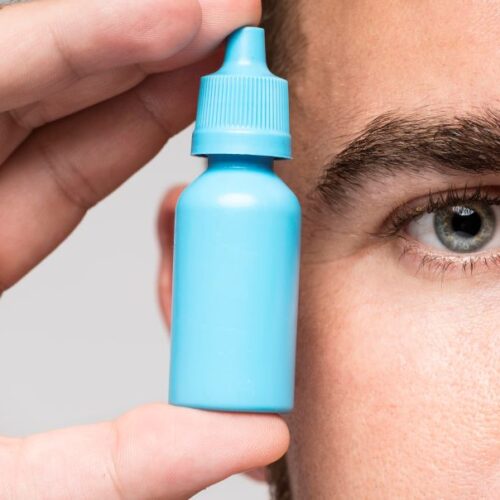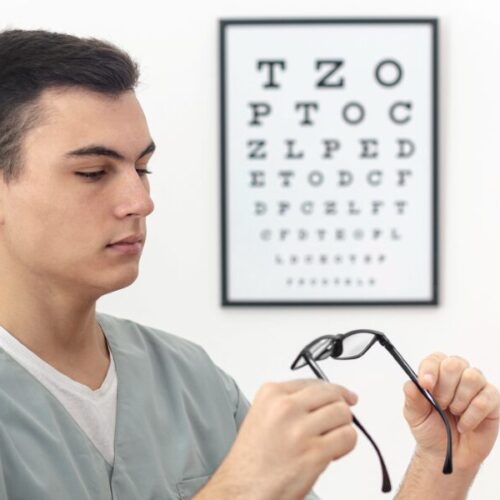Surgery like keratoplasty and cutting-edge treatments like corneal cross linking procedure are becoming increasingly popular in eye care. This article will shed light on keratoplasty and corneal cross linking procedure, two advanced procedures for ocular health.
We will explore corneal cross linking side effects and corneal cross linking recovery time. You will learn about the procedures that will change your perspective. Let’s explore keratoplasty and corneal cross linking procedure.
What is Corneal Enhancement?
출처 : freepik
A primary goal of corneal enhancement is to improve visual acuity and correct corneal irregularities. This specialized approach aims to optimize vision by employing various techniques tailored to individual needs. Corneal reshaping with keratoplasty is a notable method that involves surgery to correct conditions like keratoconus or corneal scarring. LASIK is a procedure that tightens the cornea by increasing the binding strength of the collagen that makes up the cornea, prevents corneal ectasia, which can occur with LASIK, and inhibits myopic degeneration.
Another innovative method is corneal cross linking procedure, a noninvasive treatment to strengthen the cornea and slow keratoconus progression. Furthermore, many people ask how long does eye surgery take for corneal cross linking. We will also answer this question in the article.
These interventions help improve vision by improving the cornea’s structural integrity. Understanding corneal enhancement can help individuals discover personalized solutions that transform their perceptions.
Effects of Corneal Enhancement
출처: freepik
Procedures for corneal enhancement go way beyond vision correction, improving the quality of life for people with irregular corneas.
Visual Clarity and Acuity
- Keratoplasty: Keratoplasty reshapes the cornea, fixing distortions caused by conditions like keratoconus or scarring on the cornea. The primary effect is a significant improvement in visual acuity, enabling individuals to perceive details with enhanced clarity.
- Corneal Cross-Linking (CXL): Corneal cross linking procedure contributes to the stabilization and fortification of the cornea. It arrests the progression of conditions like keratoconus and improves visual acuity over time.
Enhanced Quality of Life
- Reduced Dependence on Corrective Lenses: Corneal enhancement often reduces reliance on corrective lenses, freeing individuals from eyeglasses and contact lens restrictions.
- Improved Daily Functionality: Better vision impacts daily activities such as reading, driving, and engaging in various tasks more confidently.
Psychological Well-being
- Boost in Confidence: Improved vision can profoundly impact self-esteem and confidence, improving an individual’s overall outlook.
- Emotional Well-being: Enhancing vision can ease the emotional burden associated with compromised vision, boosting mental health.
Ultimately, corneal enhancement offers a holistic transformation that empowers individuals to navigate life with newfound visual prowess and confidence.
Who Should Have Keratoplasty?
출처: freepik
Individuals with specific corneal conditions that significantly impact their vision and quality of life should consider keratoplasty. Specific criteria may indicate whether keratoplasty is appropriate, though it should be discussed with an eye care professional.
Patients with keratoconus and family history of keratoconus
Cone keratoconus is a non-inflammatory cause of corneal thinning and protrusion that results in negative astigmatism, meaning that the convexity of the cornea protrudes into a point. Once keratoconus develops, the cornea continues to thin and the condition becomes severe as the cornea is unable to receive light.
Corneal enhancement surgery is often performed on patients with advanced keratoconus who have this thinning and bulging of the cornea. This surgery aims to restore the shape of the cornea and improve vision.
Patients with myopic degeneration, hyperopic retention, and complications
Corneal enhancement is also recommended for patients who are concerned about myopia regression after LASIK, LASIK surgery, and for patients who have pre-existing hyperopia or complications from flap creation.
Corneal scarring
Trauma, infection, or previous surgery can cause scarring of the cornea, which can impair vision. Corneal enhancement is often considered to address vision impairment caused by extensive corneal scarring.
Thin corneas
Corneal enhancement is indicated for patients with thin corneas, such as those who wear contact lenses for long periods of time or are highly myopic patients who had a large amount of corneal flap removed during surgery.
Corneal Cross Linking Surgery Process 
출처: freepik
Keratoplasty strengthens the cornea to prevent the progression of conditions such as keratoconus. Understanding the process of keratoplasty is essential for patients undergoing this procedure. At GS Ophthalmology, we use the Avedro Collagen Crosslinking (Avedro KXL system)
to strengthen the weakened cornea by increasing the binding power of the collagen that makes up the cornea.
STEP 01. Absorb VibeX into the parenchyma of the post-LASIK cornea.
STEP 02. Wash off the applied solution.
STEP 03. UVA (ultraviolet light) irradiation with the corneal enhancement program.
Ultimately, corneal cross linking recovery time varies from person to person, but it generally takes several weeks for the eye to recover fully.
Corneal Cross Linking Side Effects
출처: freepik
While exploring the transformative benefits of corneal cross-linking it’s crucial to consider potential corneal cross linking side effects. Corneal cross linking side effects in the postoperative period include mild discomfort, light sensitivity, and temporary blurriness. Dry eyes, a common occurrence, can be managed with prescribed lubricating eye drops.
During the recovery phase, patients should expect fluctuations in vision and increased light sensitivity (photophobia). The corneal cross linking side effects are generally transient, with a smooth recovery and long-term benefits like corneal stability and better vision. Timely communication with your eye care professional ensures you get the proper guidance and intervention.
You may now be wondering how long does eye surgery take for corneal cross linking. It usually takes about an hour. Consult GS Opthomology for more accurate answers and reliable corneal cross linking procedure.
GS Ophthalmology’s unique corneal enhancement with collagen
출처: Freepik
Collagen is an elasticizing component of the body that can be injected into the skin or ingested. Depending on the form it takes, collagen can replace many parts of the body, including ligaments, skin, and the cornea. In the case of keratoconus, a condition in which the cornea is thinned and protrudes due to non-inflammatory causes, causing astigmatism, porcine collagen can be used as a filler in the middle layer of the cornea.
Corneal Enhancement Frequently Asked Questions
Q: I’m unfamiliar with the procedure, what is keratoplasty?
A: Corneal enhancement, also known as LASIK Extra, is a procedure that is performed as an adjunct to refractive surgery (Smileys, LASIK, LASIK) to strengthen the weakened cornea.The surgical procedure is performed as a secondary corneal collagen cross-linking procedure immediately after laser vision correction. The surgery takes 3 to 5 minutes.
Q: Does keratoplasty have a proven safety record?
A: It is a safety-oriented surgical system approved by CE, FDA, and KFDA for collagen cross-linking for cone corneas.Keratoplasty has been performed steadily for more than 100,000 cases in 55 countries including Europe and North America.
Q: What are the effects of keratoplasty
In the 1990s, when LASIK was introduced, personal electronic devices were not as popular as they are now, so it was possible to maintain vision for a long time after surgery. However, nowadays, due to excessive exposure and use of electronic devices, it is difficult to maintain vision after surgery. Corneal enhancement can inhibit myopic degeneration after surgery.
Q: Is corneal enhancement available for all surgeries?
A: It is possible for Smileys, LASIK, LASEK, etc. using laser. However. Lens implantation is not possible.
Q: I had LASIK in the past, can I have corneal enhancement?
A: Yes, you can. Patients who have undergone surgery in the past can also receive it to prevent myopia degeneration.
GS Ophthalmology:
The Best Choice for Corneal Cross Linking Procedure
Our renowned Korean doctor at GS Ophthalmology guides your path to clear vision. We know how important a clear vision is and how much it can affect your life. Our Korean doctor leads us in providing top-notch eye care, making us your trusted partner.
We use state-of-the-art techniques to administer corneal cross-linking (CXL) with our experienced ophthalmologists. Our personalized approach under our Korean doctor‘s guidance ensures that your specific needs are addressed fully. From the initial consultation to the postoperative care, our Korean doctor fosters confidence and trust throughout the treatment process.
A corneal cross-linking procedure at GS Ophthalmology means choosing a center that prioritizes precision, safety, and optimal outcomes. Leading by our Korean doctor, we strive to stay abreast of the latest advancements in ophthalmic care.
Also, we are available if you have any questions regarding corneal cross linking surgery, such as how long does eye surgery take.
Difference between cataract and glaucoma?
What is Cataracts and how to treat Cataracts?
The Cataracts occurs when the natural lens at the back of the iris and pupil becomes cloudy. The most effective way to treat cataracts is to under go cataract surgery to restore vision by removing and replacing the cataract-affected lens with an artificial one.
What is 2-Day Lasek?
2-Day Lasek is a revolutionary laser eye surgery technique developed to boost your vision with minimal discomfort and a quick recovery.
How much does eye surgery in Korea cost?
According to the Medical Tourism site's chart, Korea ranked second as the best destination for laser eye surgery because of its advanced technology and affordable price. The total cost for both eye surgeries in Korea is lower than that in other countries. Don't hesitate to contact GS Eye Clinic via our KakaoTalk Channel for more information about the total price of eye surgery in Korea.
GS Ophthalmology Center
Directions 8,15,16F, Mizin Plaza, 390 Gangnam-daero, Gangnam-gu, Seoul, Korea






